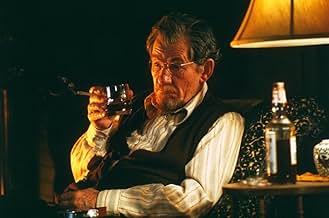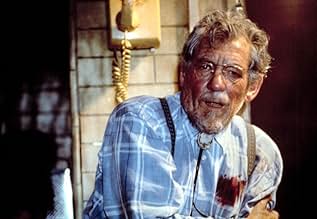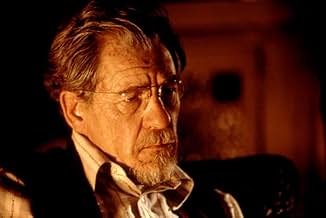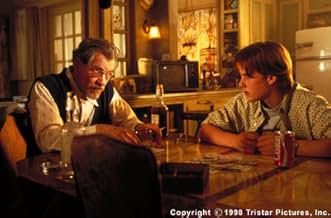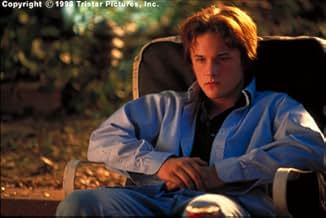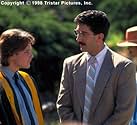Un garçon fait chanter son voisin qu'il soupçonne être un criminel de guerre nazi.Un garçon fait chanter son voisin qu'il soupçonne être un criminel de guerre nazi.Un garçon fait chanter son voisin qu'il soupçonne être un criminel de guerre nazi.
- Réalisation
- Scénario
- Casting principal
- Récompenses
- 6 victoires et 10 nominations au total
Avis à la une
Apt Pupil is one of the most chilling King works I've ever read with only Children of the Corn being scarier. It's a cat-and-mouse story of a cocky, smart American kid who discovers that man who lives near him is actually a fugitive NAZI--one of the evil high-ranking officers that has thwarted the authorities for decades. But instead of doing the obvious right thing and turning him in, the boy engages in a deadly quid-pro-quo game of blackmail: he tells "Arthur Denker"--real name Kurt Dussander--to tell him everything that is too explicit for the war books and magazines.
The novel has a very dark ending, which you'd expect when a person makes a critically terrible decision and then tries endlessly to cover it up. This movie almost completely sanitizes it. Further, Brad Renfro was a horrible miscast as Todd Bowden. He acts nothing like the Bowden in the book. The pacing for this film was all wrong and never allows any of the characters to sufficiently develop. Only Ian McKellan and the well-intentioned efforts of David Schwimmer save this film from being a total skunk.
Okay, minor correction: WWII has virtually nothing to do with this story, given it takes place in 1984. There is a Nazi involved, though: his name is Kurt Dussander (Ian McKellen), but he's been living quite peacefully in your average American neighborhood under the name Arthur Denker. However, a young boy named Todd Bowden (Brad Renfro from the Grisham-inspired The Client) manages to uncover the old man's real identity thanks to some thorough research and tells him about the discovery. The unexpected thing is, Todd doesn't want to report Dussander to the police. What he really wants is to learn everything - and he repeatedly emphasizes the word "everything" - about the former Nazi's work under Hitler's regime. Soon enough, the perverse bond between the two starts affecting the boy's grades and behavior, and Dussander isn't unaffected either: somewhere deep inside lies the old Nazi, and that part of his personality would like to come out and play.
The film's screenplay sticks quite faithfully to the basic idea of King's story and reproduces some of the most famous scenes verbatim (except for one moment of animal cruelty, which had to be softened), although a few subplots are excised, presumably for the sake of length and pace. The downside of that is an occasional lack of detail, especially when it comes to the development of Renfro's character. Director Bryan Singer, who obviously found himself in an uncomfortable position to begin with, having to live up to the success of The Usual Suspects, makes up for this flaw by constructing a genuinely tense and unnerving atmosphere, adding to the moral ambiguity by highlighting the homosexual subtext already present in the book (when Todd tells Dussander to f*ck himself, the latter replies: "My dear boy, can't you see? We're f*cking each other.").
Acting-wise, the limelight is inevitably placed on the leading duo, even if the supporting cast, which includes fine character actors like Bruce Davison and Elias Koteas, is quite strong (with the exception of David "Ross" Schwimmer, who isn't entirely at ease in a serious role). Renfro's performance is solid and captivating enough, but like his character he is completely overshadowed by the superb, unsettling McKellen, who inhabits the role of Dussander with his usual Shakespearean grandeur. Case in point: the unforgettable moment when the old man is forced to wear an old SS uniform Todd got his hands on. McKellen carries out the assignment with the dignity of a great tragic thespian, nailing the scene as one of the essential samples of his film career.
Apt Pupil distances itself from The Shawshank Redemption and Stand by Me in that it isn't as accomplished, most notably when it comes to the inevitable book/film comparison. Then again, it tells a much darker story, which asks the audience to root for a psychotic teenager and an aging Nazi. Flawed it may be, but it certainly is interesting (not to mention carried by an astounding McKellen). It is indeed a different season.
I really liked this film. I'm always wary of King movies, because so many directors have botched them. Bryan Singer ("X-Men") is not one of those directors, really capturing the crux of the story here and focusing on the Nazi elements. The imagery and symbolism wasn't overdone, yet not underplayed. I found every scene convincing (although I'm not sure how seeing a photo from the 1940s in Germany would make you suspect a man in America in the 1980s).
Aside from Ian McKellen (who is now best known as Magneto or perhaps his "Lord of the Rings" alter ego), the cast is just phenomenal. Joshua Jackson plays best friend Joey and David Schwimmer, whom I normally can't stand, plays the sexually ambiguous guidance counselor with a bad mustache. Even Elias Koteas (Casey Jones from "Teenage mutant Ninja Turtles") shows up as a homeless alcoholic, who really shines.
The tension in this picture is strong, as the bond between the two friends (or adversaries?) gets stronger. There are times where you don't know who's going to win the power struggle... and once the Israelis enter the scene, it gets even more complicated. You really don't want the Israeli police going after you (as we see in this film).
Anyway, this was a winner. It was in the favorites section of Family Video, and I can understand why. We had humor, drama and a touch of horror (no real romance, though -- maybe briefly). A more well-rounded picture would be hard to find for someone who likes movies off the beaten path... this film is unique.
Anyhoo...
There have been many films and books that attempt to explain the horror that we humans are capable of. While I haven't read the Stephen King nouvelle "Apt Pupil", I can tell you this film adaptation kept my attention and tossed around some new ideas I hadn't really considered.
If you haven't already seen it, search for the Stanley Milgram experiment. It was a psychological test done by a Yale student back in the 1960s offering one of the most chilling explanations for the phenomenon of Nazism, a convincing illustration of how humans can do horrific things. The gist is that we convince ourselves that we're doing what we're supposed to be doing ("just following orders" or "everyone told me to do it"). The video is online on dailymotion.
"Apt Pupil" surprised me by taking a very different approach which I won't ruin for you. I'll just say that it weaves a complex Machiavellian scheme, where evil is deliberate and conscious of itself. It finds its footing by creating a balance of power, reminiscent of the "mutual assured destruction" philosophy in the 80s that led the USA and Russia to stockpile enough nukes to send us to the Smurf universe.
OK, enough background. Let's talk about the film already. If the premise doesn't capture you instantly, the impressive directing and musical score should suck you in with its heavy, foreboding mood. Ian McKellan (probably best known as Gandalf from The Lord of the Rings but also an accomplished Shakespearean actor) is excellent in the role of an ex- Nazi... a menacing enigma somewhere between a serial killer and a cranky grandfather.
Brad Renfro appears on screen as the perfect naïve kid with a perpetual deer-in-the- headlights expression, sort of like John Cusack in the 80s but without the laughs. The film focuses mainly on the transformation of Renfro's character. It's here where I was unconvinced, and I docked the film a point or 2. Renfro's character mutates so suddenly and drastically you'd think he sucked down some radioactive sludge. I feel a lot of his "experiments with evil" were uncharacteristic and thrown in for shock value. No matter how curious a person is, nobody goes from Pollyanna to animal mutilations in just a month or two. It was this seemingly random, inexplicable moral decay which I felt was just injected for cheap shock value. If you can get past that, the real theme emerges.
The root of human evil, according to "Apt Pupil," is not random moral decay but actually a complex struggle for power. When this theme emerged in the latter half, that's when I perked up and paid attention. The story then takes on a suspenseful air, and the kid & the Nazi get into an interesting game of cat & mouse.
Overall, I'll stick with the Stanley Milgram experiment for the most convincing explanation of human atrocities. But "Apt Pupil" definitely delivers some food for thought. Another film that provides insight is the criminally underrated "Exorcist III" with George C. Scott and Brad Dourif playing mind games in an insane asylum. Also check out the documentary "Aileen: Life and Death of a Serial Killer," or on the lighter side, "Dr. Strangelove" makes an interesting commentary on why humans commit genocide. Who knows why humans kill, maim and torture. But as long as we keep investigating there may be hope for us.
Stephen King Movies Ranked by IMDb Rating
Stephen King Movies Ranked by IMDb Rating
Le saviez-vous
- AnecdotesSir Ian McKellen admitted he was surprised to be asked to play 75-year-old Kurt Dussander, since he was nearing 60 at the time of production.
- GaffesSome question Dussander's description of carbon monoxide gas being introduced to gas chambers through pipes, pointing out that Nazi extermination camps used Zyklon B pellets dropped through openings in the roofs of the chambers, which then released prussic acid (hydrogen cyanide) gas. While the extermination camps, Auschwitz I, Auschwitz II-Birkenau, Majdanek and KZ camp Sachsenhausen and Dacau did use the Zyklon B method, most of the other major extermination camps (Belzec, Sobibor, and Treblinka II) and KZ camps used large gas or diesel engines to produce carbon monoxide exhaust, which was then routed to the gas chambers through pipes. This was learned from the experiences of the T-4 project. (The Chelmno camp had no gas chambers, it instead used gas vans, in which the vans' own carbon monoxide exhaust was routed to the rebuild and airtight cargo bay of the vans, which held the victims.)
- Citations
[last lines]
Edward French: Now, wait a minute. You're going to tell people that I did something to you, Todd?
Todd Bowden: I don't want to drag you down with me, but I will. I'm better at this then you are.
Edward French: Better at what? I'm trying to help you, Todd. Can't you see that?
Todd Bowden: You've helped enough.
Edward French: I am not going to do nothing.
Todd Bowden: Well, you'll fucking have to! If you ever tell anyone about this... the things I'm gonna say about you... they'll never go away. Not for you. Not for your life or career. Think of your job. Think of your son. Even if no one believes me, the police and media will make a background check on you and they will find something. Some dirt such as... the real reason why your wife left you.
[after a short pause]
Todd Bowden: So... what's it gonna be? Do we have a deal?
Edward French: You can't do this, Todd.
Todd Bowden: [coldly] You have no idea what I can do.
- Crédits fousThe film has a 1997 copyright date in the credits.
- Versions alternativesAccording to the Technical Specifications link for this film, there is a one minute longer version available in Argentina (total time 1 hr 52 min (112 min)).
- Bandes originalesTristan Und Isolde
Written by Richard Wagner
Performed by Carlos Kleiber and The Bayeurth Festival Orchestra
Courtesy of Koch International by arrangement with Source/Q
Meilleurs choix
- How long is Apt Pupil?Alimenté par Alexa
Détails
- Date de sortie
- Pays d’origine
- Langues
- Aussi connu sous le nom de
- Un élève doué - été de corruption
- Lieux de tournage
- Sociétés de production
- Voir plus de crédits d'entreprise sur IMDbPro
Box-office
- Budget
- 14 000 000 $US (estimé)
- Montant brut aux États-Unis et au Canada
- 8 863 193 $US
- Week-end de sortie aux États-Unis et au Canada
- 3 583 151 $US
- 25 oct. 1998
- Montant brut mondial
- 8 863 193 $US
Contribuer à cette page




